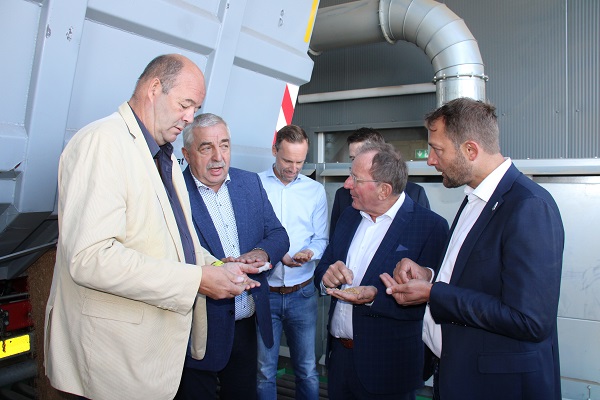 (L-R) Claude Haagen, Luxembourg's Minister of Agriculture, Viticulture & Rural Development; Carlo Hess, LSG; Jean Muller, Moulins de Kleinbettingen; Fernand Etgen, President of Chamber of Deputies; Christophe Hansen, MEP;
Credit: MA
(L-R) Claude Haagen, Luxembourg's Minister of Agriculture, Viticulture & Rural Development; Carlo Hess, LSG; Jean Muller, Moulins de Kleinbettingen; Fernand Etgen, President of Chamber of Deputies; Christophe Hansen, MEP;
Credit: MA
On Thursday 14 September 2023, Luxembourg's Minister of Agriculture, Viticulture and Rural Development, Claude Haagen, and representatives of the cereals sector presented an update on this year's harvests.
Minister Haagen was joined on LSG's premises in Colmar-Berg on this occasion by Steve Turmes, Director of the Lëtzebuerger Saatbaugenossenschaft (LSG), Serge Turmes, Director of De Verband, Jean Muller, Director of the Moulins de Kleinbettingen, and Günter Mertes, Manager of the Bauere Kooperativ SC (BAKO).
This year's cereal harvest was characterised by an "exceptionally" early start and late finish due to heavy rainfall. There were extreme weather variations this summer, ranging from heat and drought in May-June to excess rain in July-August. As such, the winter barley harvest began exceptionally early, in mid-June. The strong rainfall in July and August delayed the end of the harvest until the end of August. The harvest campaign lasted two months.
Winter cereal yields were slightly lower than the multi-year average. In the Gutland region, winter cereal yields were more influenced by drought than in the Oesling. The quality of the bread wheat harvested varied greatly depending on the region: in the south, the harvest of almost all cereal crops could be concluded before the rain arrived and the quality was found to be good; in the north, the quality of the cereals suffered greatly from the rain which caused the lodging and germination on the ground of the grains. The yields of the summer cereals were quite low due to the difficult conditions during sowing in March-April and drought in May-June.
Those present on Thursday noted that half of the Grand Duchy's agricultural surface is devoted to pastures and meadows and forage crops are particularly important for animal feed and dairy production. For the most part, the first cut of the meadows was abundant. The drought in May and June, however, significantly delayed the regrowth of the grass after cutting the hay. The yield of the second cut was low and the third cut was almost zero. The corn harvest was variable, with the drought of May-June having led to a reduction in the quantity of corn. Following the rains of July and August, the corn silage harvest is expected to be of good quality.
Regarding potato cultivation, cold temperatures and periods of drought in spring slowed down the normal development of potatoes. The potato plants produced a small number of tubers. Due to the extreme weather conditions, the size of the potatoes are "rather average".
For all agricultural crops, prices fell sharply and returned to levels similar to those from before Russia's war against Ukraine. Although the strong price fluctuations have currently calmed down, the situation remains volatile.
Minister Haagen stressed that the current uncertain situation requires a very prudent and vigilant management of agricultural operators. The selling prices of cereals have fallen while the inputs (energy, fertiliser) necessary for their production have been paid at high prices, so that cereal producers sometimes struggle to cover their costs.
With agriculture being highly exposed to climate change and extreme weather, Minister Haagen described the insurance against yield losses (the Ministry of Agriculture, Viticulture and Rural Development subsidises up to 65% of the cost) as particularly important for farmers: "This year's harvest - crops and permanent grasslands combined - was insured for a value of approximately €150 million. For cereals alone, the insured damages are paid to more than 450 farms with a damaged area of more than 9,000 ha."
Whilst the results of the insurance against drought on meadows and pastures have not yet been finalised, the loss of harvest following the drought of May-June is set to be compensated (based on initial calculations) in the most severely affected regions of the country.








